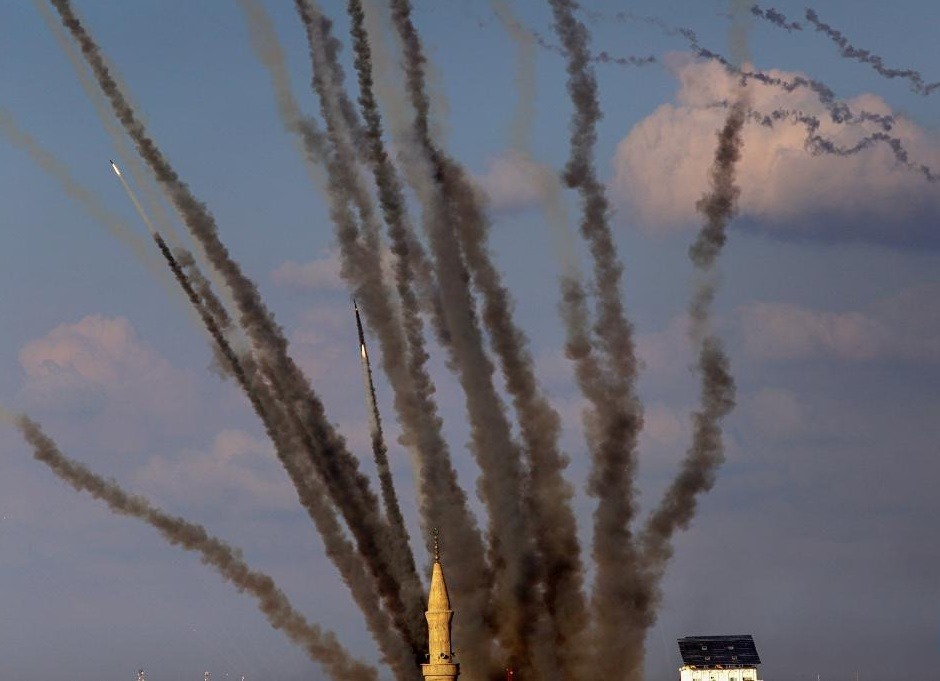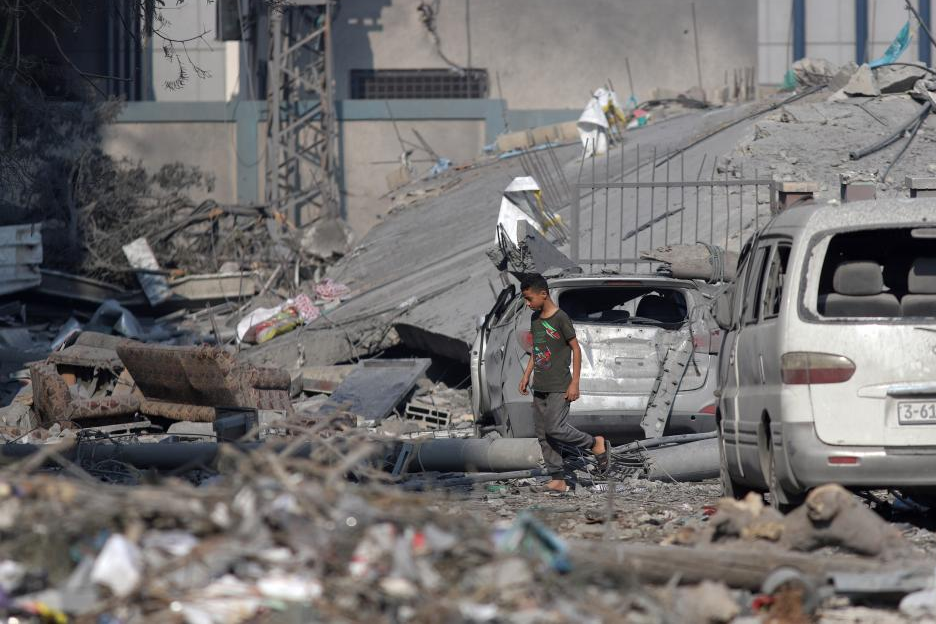Indicating that Iran might be bracing for a “deep jump” into the conflict, its Foreign Minister Hossein Amir-Abdollahian said that the destructive war may expand to “new fronts”, writes Mohammed Anas
The signals of endgame in the Hamas-Israel conflict hint towards more dire consequences. While the Israeli assault in Gaza continues to pile up humanitarian catastrophe, new fronts are set to open up, as the Iranian foreign minister has warned.
Israel has cut all essential supply to the Strip – food, fuel, electricity and humanitarian aid. It has also given a 24-hour ultimatum to the UN mission and Gaza population to vacate the area. It has conditioned the flow of aid to Gaza with the release of Israeli hostages held by Hamas.
As this article is being written, tens of thousands of Israeli Defence Forces soldiers are stationed near Gaza, ready to enter. Israel’s security cabinet has met multiple times and made decisions that have remarkably not been leaked to the press. Chances are that the ministers were briefed about the IDF’s operational tactics and targets. But has Israel finalised the actual goals of the war?
Strategic Affairs Minister Ron Dermer, the minister closest to Prime Minister Benjamin Netanyahu, spoke only this much: “We need to cripple the capacity of the terrorists.”
Hamas’ future looks bleak. Israel is determined to eradicate it from Gaza and hunt down senior leaders. For Israel, too, any sense of victory will be short-lived.
Should it succeed in exacting vengeance on Hamas, it will be left with a broken Gaza Strip with no obvious exit strategy. To avoid a security and governance vacuum, it will have to either govern the Strip itself, as was the case prior to the Oslo Accords; or bring back a brittle and discredited Palestinian Authority which will struggle to impose its writ.
Either option will create new drivers of political instability and insecurity.
There could be another murky outcome of the conflict. The Israeli euphoria over blitzkrieg and destruction of Gaza will almost certainly radicalise new generations in the region and in the West. This dynamic is a godsend for terrorist groups such as ISIS, Al Qaeda, and new iterations of violent extremism.
At this stage, Iran is a strategic beneficiary: The accession of Saudi Arabia of the Abraham accords has likely been derailed. Qatar, a prime supporter of Hamas, may be quietly savoring its revenge against its Arab competitors in the Gulf. Turkey, a friend of the Muslim Brotherhood, also comes out as a beneficiary relative to Saudi Arabia and Egypt.
As of now, Russia will likely benefit from the sidelining of the war in Ukraine. China basks in the thus far unbankable glow of being cast as a potential mediator.

The United States, which relinquished its role as the strategic prime mover in the region after the so-called red-line crisis of 2013, when it did not intervene in the war in Syria, may reaffirm its primacy. This could reinforce US credibility in Europe. Indeed, there is some talk in Washington of coupling military assistance to Israel and Ukraine.
Meanwhile, all of the above is subject to a brutal change if Hezbollah, supported by Iran, were to enter the war in a big way.
Iran, whose support of Hamas allows it a window into the Arab-Israeli conflict through which it can project its influence and weaken Israel. It has clearly benefited from the Hamas attack which has eroded Israel’s deterrence and constrained Israeli-Saudi normalisation and placed Iran in the dock.
But like Hamas, Iran’s gains could erode if Israel succeeds in weakening the Hamas hold in Gaza or if the conflict broadens and leads to a direct confrontation between Israel and Iran.
Indicating that Iran might be bracing for a “deep jump” into the conflict, its Foreign Minister Hossein Amir-Abdollahian said that the destructive war may expand to “new fronts”.
“Some European officials asked me if there were any chances that new fronts might open up against the Zionist regime?” Amir-Abdollahian said on Thursday in the Lebanese capital of Beirut, his second stop on a regional tour that also took him to Iraq.
“I told them as long as the Zionists keep up their war crimes, there exists every prospect that other resistance movements (may enter the war),” he added.
“We are in Beirut to announce with a loud voice that, along with (other) Muslim countries and governments, we will not break the Zionist regime’s crimes against the people of Gaza.” Amir-Abdollahian said.
Echoing this, Lebanese resistance movement Hezbollah said the group’s “guns and rockets” were with Palestinian fighters.
Iraq’s anti-terror group Kata’ib Hezbollah threatened to target American bases in the Arab country and the entire region if the US intervened in the ongoing fighting between the Palestinian fighters and the Israeli regime.
However, undaunted by these “threats”, Israeli opposition leader and former prime minister Yair Lapid told France 24 that there will only be one endgame of the conflict: “There will be no Hamas in Gaza.”

Tardy Diplomacy
Grandmaster of diplomacy Henry Kissinger shot to cult status as the greatest strategist negotiator after his role in bringing Israelis and Arabs to the dialogue table after the 1973 Yom Kippur War. Little do people know that Kissinger played deliberate “delayed diplomacy”. The ongoing Hamas-Israel war has echoes of Yom Kippur and the same “delayed diplomacy” plot being reenacted.
The recently published book Master of the Game: Henry Kissinger and the Art of Middle East Diplomacy written by Martin Indyk, former US ambassador to Israel and special envoy for the 2013 Israeli-Palestinian negotiations, provides insights into Kissinger’s diplomatic negotiations in the Middle East.
Kissinger had advised the US government not to help Israel in the 1973 war until the Egyptians crossed the Suez Canal and captured much of the Sinai Desert, in order to shock Tel Aviv and shake its concept of unassailability.
Consequently, the 1973 war increased Israel’s willingness to negotiate with its Arab neighbors. In 1979, Israel signed a peace treaty with Egypt, the first with an Arab country, which was later reflected in the Oslo Accords with the Palestinians.
The October 7 Hamas raids into Israeli cities too is seen as a jolt to Israeli defence forces’ invincibility. However, there is no Kissinger on the scene and the Western powers led by the US so far are solidly behind Israel. They have thus far shown no willingness to mediate dialogue, not even for release of Israelis held hostage by Hamas.
The United Nations Security Council meeting ended without any statement. On Tuesday, UN chief Antonio Guterres called for a flow of humanitarian aid to Gaza after Israeli military blitzkrieg left total devastation in the blockaded strip along the sea.
He also said that he calls for an end to “the vicious circle of bloodshed, hatred and polarisation”.
Besides, the European Union has announced that it will not suspend payment of development aid to Palestinians, reversing course after an earlier announcement that it would freeze all aid payments was met with widespread criticism.
But the EU aid is for the Palestinian Authority that controls the West Bank and parts of Jerusalem. The 296 million euros ($312m) in financial assistance from the EU will help cover expenses for the PA, such as infrastructure projects and civil servant salaries.
Arab and Muslim countries backing Palestinians have not been able to move any substantial diplomatic initiative. Iran has called for a united “ummah push”, but it hasn’t found any backing.
Arab League foreign ministers will meet on Wednesday to find “avenues of political action at the Arab and international level,” as Israel keeps pounding targets in Gaza.
Reuters reported on Monday that Qatari mediators held urgent calls to try to negotiate freedom for Israeli women and children seized by militants in Gaza in exchange for the release of 36 Palestinian women and children from Israel’s prisons.
An Israeli official however in a comment to The Times of Israel that “there is no negotiation” for the release of hostages.
Most influential Arab country Saudi Arabia, which was holding parleys with the Israeli government for normalisation only till last week, have also remained clueless about the diplomatic route that may end the mayhem in the Middle East where the public anger is expectedly mounting in favour of Palestinians.
AFP reported late on Tuesday that Saudi de facto ruler Crown Prince Mohammed Bin Salman held talks with Palestinian President Mahmoud Abbas and claimed that he was trying to prevent “an expansion” of the conflict.
Big powers like Russia and China too have eluded from taking active part and hurried up diplomacy to stop the conflict from festering further. Russia late on Tuesday offered to work with the Arab League to push for a solution.
“Russia and the Arab League, all members of this organisation, can and should contribute to solving problems, first of all, ending the bloodshed and suffering of civilians,” Russia’s Foreign Minister Sergey Lavrov said at his meeting with the Arab League Secretary-General Ahmed Aboul Gheit in Moscow.
Delayed or absent diplomacy has led West Asia commentators to predict more sinister scenarios which even can turn into wider regional catastrophe.
Mohammed Alhaya, a senior fellow at the Hudson Institute’s Center for Peace and Security in the Middle East, wrote in the Washington Post that the possible outcome of the current flare-up will have to tilt towards settling the question of Palestine.
“The latest Israeli-Hamas war makes abundantly clear that there can be no lasting peace in the Middle East without a regional solution to the long-running conflict between Israelis and Palestinians,” he wrote, adding that if the Israeli strikes continues in Gaza and diplomacy fails to prevent the onslaught, it will strengthen the position of Iran in the region.

Leave a Reply